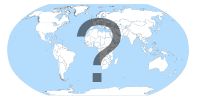Bids for the 2000 Summer Olympics
| Overview | |
|---|---|
| Games of the XXVII Olympiad XI Paralympic Games |
|
| Logo of the campaign. | |
| Sydney Beijing · Berlin · Istanbul · Manchester |
|
| Details | |
| Committee | IOC |
| Election venue | Monte Carlo 101st IOC Session |
| Map | |
|
|
|
| Important dates | |
| Decision | 23 September 1993 |
| Decision | |
| Winner | Sydney (45 votes) |
| Runner-up | Beijing (43 votes) |
Lua error in package.lua at line 80: module 'strict' not found.
Five cities made presentations to the IOC Session in Monte Carlo to host the 2000 Summer Olympics. These were awarded to Sydney, Australia, on 23 September 1993. The other cities were Beijing (China), Manchester (Great Britain), Berlin (Germany) and Istanbul (Turkey).
Brasilia, capital of Brazil, and Milan, Italy, withdrew during the bidding process – Milan shortly after submitting its bid book,[1] Brasilia following the visit by the IOC Inspection Group, which stated the city had substandard facilities. Tashkent, Uzbekistan, also put in a bid for the Games, in order to gain some recognition of that country's existence and new independence,[2] but withdrew very early into the race.
Berlin was an early front-runner, hoping to cap the decade of German reconstruction and reunification by hosting the first Games of the new millennium. But the support of its bid was marred when anti-Olympic protesters marched through the city just four days before the final vote in Monaco claiming that the games would take funds away from further reconstruction efforts.[3] Manchester's bid book was considered strong, but with much regeneration in the city needed, and with a promotional video shown to the IOC depicting London landmarks such as Buckingham Palace and Tower Bridge, the bid was criticised heavily by the British media sighting that the city's bid was 'suffering from an identity crisis'. The impeding announcement of the host city came down to a head-to-head between Sydney and Beijing with Manchester, Berlin and Istanbul ranked outsiders.
When IOC president Juan Antonio Samaranch thanked the five competing cities before announcing the winning bid, many Chinese in Beijing mistook his utterance of the city's name, before any of the others, as an announcement that it had been awarded the Games, and widespread celebrations began. These were cut short just minutes later when images from Sydney came through, illustrating the fact that the Australian city had won.[4]
The International Paralympic Committee then awarded the 2000 Summer Paralympics to Sydney.[5]
Contents
Reactions by Beijing
According to The New York Times, university students in Beijing made plans to march on the American embassy in Beijing as news of Beijing's failed bid spread. Police presence was stepped up across Beijing university campuses to prevent this from happening.[4] There were also suggestions by Chinese officials that Beijing would boycott the 1996 Summer Olympics because of the failed bid.[6] The US intelligence community also reported before the vote that should Beijing lose the bid, the Chinese government would resume underground nuclear testing, in violation of a worldwide moratorium on the process.[7] Beijing, however, did no such thing, and in 2001 made a successful bid to host the 2008 Summer Olympics.
Final selection
| 2000 Summer Olympics bidding results | |||||
|---|---|---|---|---|---|
| City | NOC Name | Round 1 | Round 2 | Round 3 | Round 4 |
| Sydney | 30 | 30 | 37 | 45 | |
| Beijing | 32 | 37 | 40 | 43 | |
| Manchester | 11 | 13 | 11 | — | |
| Berlin | 9 | 9 | — | — | |
| Istanbul | 7 | — | — | — | |
References
- ↑ Lua error in package.lua at line 80: module 'strict' not found.
- ↑ Lua error in package.lua at line 80: module 'strict' not found.
- ↑ Lua error in package.lua at line 80: module 'strict' not found.
- ↑ 4.0 4.1 Lua error in package.lua at line 80: module 'strict' not found.
- ↑ Lua error in package.lua at line 80: module 'strict' not found.
- ↑ Lua error in package.lua at line 80: module 'strict' not found.
- ↑ Lua error in package.lua at line 80: module 'strict' not found.
